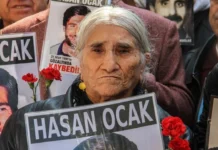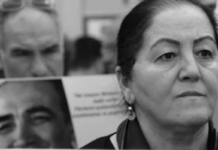A proposed bill approved by the Turkish Parliament’s Justice Committee would provide the state more control over nongovernmental and civil society organizations, said Gülseren Yoleri, chair of the Human Rights Association’s (İHD) İstanbul branch, the Bianet news website reported.
The controversial provisions that give the government more power to police and control NGOs are part of a new bill to “Prevent the Financing and Proliferation of Weapons of Mass Destruction,” which will be debated in the General Assembly in the coming days. According to Yoleri, although the first six articles of the bill counter-terrorism, the proliferation of weapons of mass destruction and money laundering, the remainder includes provisions that could be used to intimidate civil society.
“The government has always exerted pressure on civil society, but this way they can ensure that this pressure has legal backing,” she said.
In the past organizations were required to be transparent concerning donations and the amount of money received. However, the new law stipulates that civil society organizations will need to obtain a license to solicit donations. If the organization collects donations without a license, they will face a stiff penalty.
Previously, civil society organizations reported directly to the Ministry of the Interior. In the event of a complaint, the ministry had the power to conduct an investigation. The new bill allows the ministry to delegate this power to local law enforcement who can investigate civil society organizations.
According to the new bill, If the police conduct an investigation, the organization is obliged to hand over all their documents or they will be fined. Yoleri said this was extremely troublesome because many human rights and civil society organizations keep their records anonymous.
“If someone applies to our organization concerning a human rights violation, we need to be able to keep their details confidential. If the police or any other organization obtains their details, this will pave the way for new violations,” she said.
The new bill also stipulates that in the event an organization is investigated, the Ministry of the Interior can directly remove its chairperson and halt its activities without a court order. It can also appoint trustees in place of removed chairpersons. The law also allows authorities to seize the organization’s assets.
Yoleri explained that previously, the government only had the power to appoint trustees in places of mayors. They could also appoint a trustee to an NGO if there was an administrative crisis and with a court order. “The new bill will reinforce the authority of the regime even more,” she said.
“There is already great pressure on civil society,” said Yoleri. “This way the government wants to silence what is left of opposing opinions in Turkey.”
She said a majority of the Turkish media and the judiciary was already close to the government and that most civil society organizations and political parties were working closely with the government. According to Yoleri, the new law aims to completely wipe out organizations critical of the government.
“When it comes to relations with Europe, reports prepared by civil society organizations are prioritized by the European Union and are appreciated as checks and balances to government reports,” said Yoleri. “This is why the government is fixed on pressuring civil society organizations to support its agenda.”
Turkey is a party to multiple human rights forums including the European Commission on Human Rights and the United Nations Convention on Civil and Political Rights that guarantee the freedom of association. The Turkish constitution similarly provides for these rights that the draft law appears to violate.















